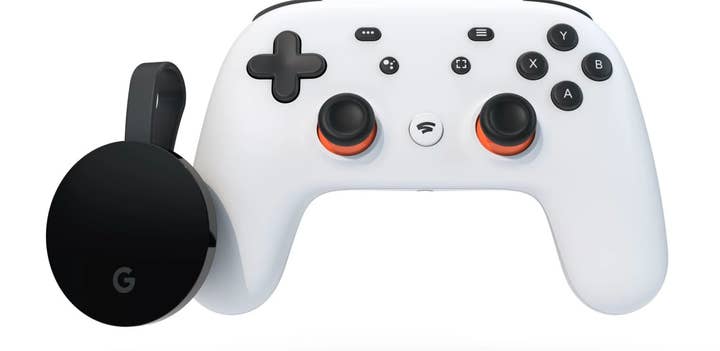Have we got Google Stadia all wrong? | Opinion
Google Stadia's focus should be on accessibility, not on subscription models or exclusives
Duncan fitted my kitchen.
He'd been in my house for about a week before we started talking video games, and he revealed to me his secret obsession with turn-based strategy games. He used to play big, complex PC strategy games in the 1990s. These days, he mostly just plays mobile free-to-play strategy titles. "They're not the same," he says. "But I don't have a gaming PC anymore."
I tried to convince him to get one. And he almost did, before he came to his senses. He wasn't going to splash out on an expensive computer just to play a new Total War game once a year.
Paula is my friend from school.
When we were kids, we used to play Doom a lot. She loved Doom. She lists it as one of her favourite things on Facebook. She really wants me to get Doom Eternal so we can play it together. She won't get it herself because she's not had a games console since her Xbox 360 suffered the Red Ring Of Death.
"The highest fidelity experience in gaming, for years, will be playing from a local device that has a direct connection to that television."
Phil Spencer, Xbox
When I think about Google Stadia, xCloud, PlayStation Now and all the other streaming platforms, I think of Duncan and Paula. Gamers, including myself, have no need for these services. Why would we? We've got more reliable consoles to play our games on, and probably will do for a while yet. It's a fact that Phil Spencer seemed to acknowledge with us at E3 last year.
"The highest fidelity experience in gaming, for years, will be playing from a local device that has a direct connection to that television, and a direct connection to your games," he said.
Game streaming isn't exciting because it gives console players a different platform to choose. It's exciting because it gives non-console players a way into the ecosystem without the barrier of having to buy expensive hardware. That's why publishers and developers are on-board with the idea.

It's not just the Paulas and Duncans of the world that might be excited by cloud streaming. It's also markets like India and South Korea, which boast millions of gamers who largely don't own a console. Any audience where the console is a barrier to entry that's too big to overcome, Google Stadia and its competitors are the solution.
Bethesda's Pete Hines put it simply when we spoke to him last year:
"When you have folks who say: 'I'm never going to play Doom Eternal because I don't have a gaming PC and I'm not spending $400 for a console,' that's the end of the conversation. They're just not someone that I can reach out to for Doom Eternal. But if you know that on basically anything that has a screen you can suddenly stream a AAA, 60fps, 4K title, you're now a customer in a way that you simply hadn't been before.
"The number of people that applies to is hundreds of millions or billions. Now I'm not saying that everybody is going to convert to a $60 AAA consumer, but you're just opening yourself up to a lot more folks who don't have to jump through all the hoops of upgrading a PC all the time, or getting the new console, or paying for that big upfront cash outlay before the even buy a single game."
It's not that game streaming isn't going to interest core gamers at all. In fact, Xbox's plans to allow its console owners to stream their content to other devices so they can take their games with them will have some appeal (including the ability to put on glorified LAN parties). But it isn't the primary reason why the wider business is excited about the prospects of the technology. For them, it's about unlocking new gamers, not speaking to existing ones.
"If you know that on basically anything that has a screen you can suddenly stream a AAA, 60fps, 4K title, you're now a customer in a way that you simply hadn't been before."
Pete Hines, Bethesda
Of course, most industry professionals understand that. But when we're talking about attracting customers who are not (at least anymore) avid console players, you have to rethink what it takes to be successful. Some of the criticism that has befallen Google Stadia is entirely understandable, but some of it needs to be taken in the context of who the service is ultimately trying to attract.
Take the idea that Google Stadia needs exclusive content. When you consider the needs of Paula and Duncan, and the objective of making games accessible to a wider audience, why is exclusive content important?
Stadia-specific games may be needed to showcase the strengths of game streaming, and to help overcome the pitfalls. But Stadia's consumer appeal will come in its accessibility, not over whether there's a game on the service you can't get anywhere else. Exclusive content matters a lot more when you're choosing between an Xbox and a PlayStation. But if your customers are people who only want to play one or two major games every now and then, there's not so much pressure to put out a raft of exclusives every year.
A reason as to why exclusives might be important is if your business model is a subscription-based one. Yet currently that is not the focus for Stadia.
That brings us neatly onto another criticism of Stadia: the fact it charges full price for games, as opposed to a Netflix-style offering. Indeed, EA stated its belief that for game streaming to work, it needs to look to how the world of TV does it.
"We've seen in other forms of entertainment that cloud streaming has been most effective when partnered with the subscription model," said EA CTO Ken Moss in a chat with us last year.
But again, although $60 for a game is likely to be prohibitive to Paula and Duncan, it's arguably more palatable than having to pay $10 a month to access a catalogue of games they don't want to play. Outside of the most hardcore players, how many games does the average person play in a year? Games are huge and expansive and ever-evolving in a way linear media isn't. You can't binge Assassin's Creed in a day like you can Stranger Things.
The subscription option may be exciting to gamers, but if you're someone who couldn't justify the cost of a console because you wouldn't use it enough, how are you going to justify spending a monthly fee to access hundreds of games?
Indeed, the business model around game streaming is going to require some testing. Not just to find out what is reasonable to Duncan, but also to work out how to monetise traditional console content in territories where the free-to-play business model tends to be dominant.

Ultimately, Google's priorities -- and those of the other cloud streaming platforms -- is to make its system as frictionless and accessible as possible. Business model is a big one, as is the input device... The fact that players need a controller is a barrier to entry that will need to be overcome.
Google already allows most controllers to work with Stadia. And Microsoft announced last year that it has added DualShock 4 compatibility to xCloud, which is significant when you consider that controller is in the homes of 100 million people worldwide. Microsoft says it's also working on getting touch controls operational so people can game using their smartphones. This will prove vital in opening game streaming up even further, and Google will be looking at that, too.
Of course, if Google's aim is to reach non-console gamers, it's not done an especially good job of it so far. You could argue that it's not quite ready to start pushing the service far and wide just yet. And indeed, it has an ace card to play in the form of YouTube. If gamers can truly, easily, play a game demo by clicking a button on a YouTube video, that could potentially unlock a massive audience. And an audience that Google's third-party partners will be eager to advertise to and help unlock.
Yet it's all potential for now. How many Paulas and Duncans are there in the world? Will non-console markets be willing to pay to access premium console content? Just how big is this market for Google and how long will it take to reach them?
These are questions that won't be answered at the launch of a service, or even six months in. These answers will only start to emerge when the real big games start to appear, and their publishers begin to advertise them to everyone who has the right internet connection. And not just those who have the right machine.

